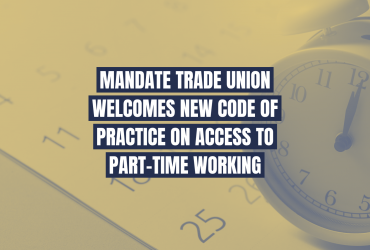
Mandate represented at Oireachtas hearing on Respect At Work Campaign
Wednesday 24 September 2025 Mandate NEC member and former Shop Steward at TK Maxx, Cian Keogh addressed a full room at the Oireachtas today, attended by TDs and Senators from across the political spectrum to hear about the urgent need for collective bargaining legislation in Ireland. He was accompanied by speakers from the CWU, FSU and SIPTU trade unions, who collectively constitute the members of the Respect at Work campaign.
Mandate NEC member and former Shop Steward at TK Maxx, Cian Keogh addressed a full room at the Oireachtas today, attended by TDs and Senators from across the political spectrum to hear about the urgent need for collective bargaining legislation in Ireland. He was accompanied by speakers from the CWU, FSU and SIPTU trade unions, who collectively constitute the members of the Respect at Work campaign.
Cian outlined the difficulties he faced as a Shop Steward in a company which does not recognise trade unions – and how workers would benefit from legislation which guarantees the ability for workers to collectively bargain with their employers.
What is Collective Bargaining?
Collective bargaining is the process of negotiation of wages and other conditions of employment by an organised body of workers, either directly in the workplace or by sector of the economy.
It has been the norm in most European countries for decades. In Ireland, however, we lag behind. While our neighbouring countries such as Italy (97%), Austria (94%), Spain (91%), Finland, France (both 90%) and Sweden (89%) have the vast majority of their workers covered by a collective agreement, in Ireland that figure is only 34%.
This means that we are out of step with other comparable countries when it comes to negotiating pay and conditions for our workers – and that the majority of Irish workers have no collective process through which they can negotiate.

Mandate NEC members Martin Mahony and Margaret Wilson, and Mandate Divisional Organiser Greg Caffrey outside the Dáil today
Ireland is one of only two countries in the EU (alongside Cyprus) where there is no recognition in legislation of the need for employee representatives to have protection against dismissal.
This means that employers in Ireland can and do unfairly dismiss employee representatives for engaging in trade union activity. Workers are then left to take a case under the Unfair Dismissals Act – but, at that stage, the damage is already done and the union busting has already occurred.
There is nothing in the Unfair Dismissals Act or any other Act in Irish law to prevent an employer from dismissing a worker for their trade union activity in the workplace including participating in negotiations about terms and conditions of employment.
The Action Plan on Collective Bargaining

The Government has said that in order to give effect to the Directive on Adequate Minimum Wages, it will bring forward an Action Plan on collective bargaining. This Plan is currently being drafted by the Department of Enterprise, Tourism, and Employment, and Minister Peter Burke has said it will be published in the coming weeks.
This Action Plan is the key priority of the trade union movement during this Dáil term.
It is an opportunity to finally give Irish workers the same rights as their counterparts across the European Union.
Union members are calling for six key reforms:
- Ban union-busting outright
- Protect union reps from dismissal or retaliation
- Guarantee the right to join and collectively bargain
- Provide paid time and facilities for reps at work
- Ensure access to union information in the workplace
- Use public money (procurement and grants) to reward employers who engage in collective bargaining
We are asking all TDs and Senators to raise this with Minister Burke in order to ensure the best possible protection for workers in Ireland.






